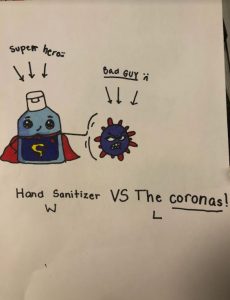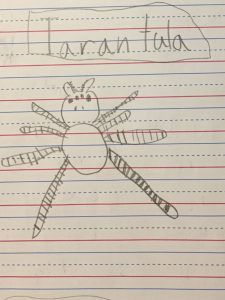
Sharon Suardi is 9 years old, currently attending Abram Jenks School. As an artist for roughly five years so far, drawing is a favorite pastime (especially when bored!), and she loves to spend her time and explore life through her artistry.
Philadelphia Stories: Publishing Local Writers & Artists

Sharon Suardi is 9 years old, currently attending Abram Jenks School. As an artist for roughly five years so far, drawing is a favorite pastime (especially when bored!), and she loves to spend her time and explore life through her artistry.
Once upon a time, there lived two powerful girls, Khadija and Janice. They came from two different backgrounds. Khadija was from Saudi Arabia and Janice was from Pennsylvania in the United States.
Kahdija went through a lot of trauma in her life, like terrorist attacks, war from America, loss of food, destruction, no education, and more.
Janice was hurt by a broken family, 9/11, police brutality, bullying, racism, and even more.These girls had been through so much pain and fright.
They thought that maybe, if they stood up, maybe they could make a change. So, these young teens made their communities a little bit better by hosting religious ceremonies and meetings, daycares, protests and other forms of community activism.
A couple years go by and it’s now 2027. The world got better, but there were still flaws that the world thought couldn’t be healed. That was all going to be changed soon!
Khadija was finally able to go to college but not in Saudi Arabia. She became a college exchange student at Temple University in Philadelphia. She didn’t know much English, but it was a good thing colleges teach ESL.
The catch was that Janice was a tutor for foreign exchange students,and she spoke Arabic because because she had lived in Mecca for two years as a child; due to her dad being in the Army. Throughout her two years there, she did not learn much because her family was so determined that Muslims were bad.
When they met, Janice wasn’t very excited to see that Khadijah was Muslim. Janice automatically said no to teaching her.
Over time, they both learned that Janice was the only one that could teach Khadijah so Janice decided maybe she could get to know her.
Khadijah and Janice started to get to know each other. Janice realized that both she and Khadijah were very alike and they both loved to help their community. They decided they wanted to make a change in the world. It took awhile but they came up with many ideas.
They did food drives for the community and classes for how people could help. Then, they finally came up with something really unique: an app!
This app would allow people to put out information on helping out the community and include events such as concerts,prayer meetings, fun things for kids and cleaning the city. It started small but it soon got bigger, the whole campus knew!
Two powerful girls from very different environments managed to create something so beautiful. It soon got all over the country and everyone played a part in saving their communities.
It’s now 2034, and the world managed to become so great, with many people around the world supporting their communities through food, religion, fun, safety, and happiness.Khadijah and Janice are still best friends. Their kids are growing up together. and they both are beside each other as members of the United Nations.
The world needs you. It always starts with community activism, but it will get bigger. Look what the Black Lives Matter protest did. It started off in just some community and it traveled nationwide and now we have the whole world able to protest for a cause so big. If you never give up, you will have a revolution…

One day I went exploring in the shed and found an orange and black tarantula. One of its legs was as long as my middle finger. It was eating a cricket. But then it moved because I poked it with a stick. I poked its abdomen and it ran away from me.
At first I saw a lot of crickets. Then I saw about five crickets. There are spiders in the shed too. The shed smells like rotten cheese. It was not totally dark.
There were cracks that let in light. The tarantula might have ran away through the cracks and now lives happily in the forest.
Leo is 7 years old. He is a 2nd grader at Sharp Elementary School in Cherry Hill, New Jersey.
I move into another apartment. This one is made of crumbling bricks and tall windows. It smells of stale bread and moldy floors. It looks like forgotten pasts and abandoned futures. This is my home now.
We get out of the taxi, my mother gives the driver some cash, then we walk through a rotting wooden door that is almost as tall as my father. The entryway is a small lounge on the ground floor which has nothing but a desk, an empty chair, and a single ringing bell. I reach to ring the bell but my mother puts her arm in front of me. Anyway, I can’t even reach the top of the desk.
As we begin to leave the room with the desk and empty chair, we go to a door with a long red handle. The door refuses to open for us the first four tries, but then finally gives in and lets us through. It leads to cement stairs and metal railings that smell of cigarettes on a Tuesday afternoon. The stairs are tall and many, the top of this flight seeming further away than my old house. Before I can say anything, my mother yanks me by my arm and pulls me up the stairs. I float away with her only being ever so slightly held back by the wind.
We climb up the large stairs for what seems like hours before we reach the hallway with many doors of which one is ours. The doors are all identical, some with more stains than others, all with the same metal handle, thin plywood, and rusty deadbolt lock. The carpeting has the same dizzying pattern that I quickly get lost in all the way down to the metallic door labeled: EXIT at the end of the hallway. About three doors away from that one, we finally reach the one we want.
The door handle is messy and rough, and it doesn’t open until my father pulls on it with all his might. The door then violently shakes, and a few more punches and pushes make it swing open to reveal the inside like a salesman on the television saying, “but wait, there’s more!” “More,” is one bedroom and a bathroom with a sofa, an old box television, and a bed large enough for my parents to sleep with each other. They still choose not to.
This isn’t what I thought it would look like. In the magazines and television movies, the people always have a home with lots of floors and sofas and tables. They always have funny looking chandeliers and TVs that are too big, with lots of stairs and tall ceilings. This one is nothing like those, the ceilings are low and drip slimy fluids on to the floor, the sofa is dirty and stained, and the TV doesn’t work unless you punch it.
I sit on the sofa where I will be sleeping and stare at that blank television. My father sets up his sleeping bag next to my mother’s bed, where she shifts her pillows around and tosses one to him. It’s not my bedtime yet so I ask to roam the hallways and my mother says I can with a mutter. My father gives her a quick glance but then quickly looks back to his book.
My father opens the door for me because I can’t seem to figure it out, then I go outside the door and begin walking. As I walk down the hallway, I put the fingertips of my right hand on the seams of the wallpaper, lifting them back up whenever there is graffiti or dead termites. I walk like this for a while, my fingers grazing all the bumps and scratches picking up all sorts of dirt and grease along the way until I reach the end of the hallway. By then my fingers are browner, so I decide I have done enough walking for today and turn around.
On the way back I see the faint figure of a white boy playing with his trucks by my room. He is small and plump with a t-shirt that doesn’t fit him, pants that are too big for him, and messy hair that almost cover his dirty brown eyes. I get closer and see that he blocks the way to my door, so I start to talk to him, hoping I could eventually kindly tell him to move.
I ask him about his trucks. He tells me what kind they are and how much each weighs. I don’t understand most of what he says but I appreciate the toys. I sit down to play with him and his replicas and reach for one of his trucks, but he grabs it and violently pulls it to his chest. He tells me I cannot touch his trucks because I am too dirty. I look at my hands in response and he reacts before I can even say anything, and tells me that it’s not just my hands. My body is dirty and so is my inside and he doesn’t spend time with dirty girls. He opens the door to his room and takes his trucks with him.
I go to sleep that night with empty thoughts. I lay my head against my pillow on the sofa and only think about sleep. The room is so dark I don’t even have to close my eyes.
Wesley Bozman is a 14-year-old freshman and Friends’ Central School. He loves writing creative fiction and music. This sample is a vignette he wrote inspired by the book, “The House on Mango Street,” as well as wanting to tell a story of a relatively small and normalized act of racism which happens much more frequently to people of color than most people would think.

It is one in the morning, as I aimlessly wander through a hallway looking at its dull grey walls, and I’m confused as to why there aren’t any doors or corners! The hallway just goes on and on, never ending in an endless line. And why am I even awake anyway?. It’s like I’m floating, and unable to feel anything. Not the floor, not the air… NOTHING. I can’t even hear anything. There are no cars, nor crickets, not even my heart beat, only eerie silence. It is strange. I don’t even remember waking up, why I’m not resting or where I even am. I only know that it is one am and I am pacing the halls because there is nothing better to do.
It’s now two in the morning. There are now doors in the hall. They are the same shade of gray that the walls were and they are all exactly 10 ft apart. I still can’t feel my surroundings, but there is a slight ringing in my ears and a sharp searing pain in my chest. I don’t know why it is there, or where it even came from, but it hurts! It burns and I’m crying non-stop, but the pain won’t go away. I’m begging for someone… ANYONE… to help me! This agonizing isolation, these hallways empty, this unbearable pain that won’t cease… and nobody is coming to help me either?!? The hallway is just empty, like always. I… I am alone.
It is now three in the morning. The doors are now red, but still wet like they were just freshly painted. It doesn’t smell like fresh paint though. I know it isn’t fresh paint. The pain has now spread from my chest to my entire body. The pain! This searing intense pain! I try to put my hands on the wall but I almost fall through. I start to cry even harder. I can’t touch anything. Everything hurts and I am still all alone.
Four in the morning… all I feel in this throbbing torture, and it is awful! The doors have now gathered pools of blood underneath them. I wonder if that means that I am getting closer to freedom? The pain has doubled and I wonder if I have almost made it this time. I place my hand on the blood-soaked door before deciding against it and continuing on the path down the hall. I only make it to the next door before I stop again. Everything hurts. I trace “help me” on the wall and almost give up right there but I have never made it this far before. I will find a way out. I finally will move on. I keep moving forwards.
It was five in the morning. Almost there! I can make it! I will finally beat this stupid curse where I am forced to relive the pain of my death, over and over again. If I can make it to sunlight I can be free! The entire floor is coated in blood now. I am so close but it all burns and when I finally think that I won’t give up, the pain tripled. I cry out in agony. I am so close… I am almost free, but I can’t do it! I am going to die!
It was almost six in the morning, and I have almost made it. I am almost free! But the pain is just too much. I simply can’t handle it. I grab the blood-covered door, and write “I’m sorry” on the wall before opening it. Just like last time, and the time before that. Over and over again I give up and I cry because I will never be free. It will always be too much! But I open the door and everything goes dark. And when I open my eyes again?
It was one am.

Collecting seashells
Overrun by the water
The waves pull me in
Going to the beach
Saltwater in my mouth, yuck
The weather is cold
Sand in my swimsuit
My brother hates the water
Playing in the sand
Silently and softly, the striped predator creeps along the edges of the marshy mangrove while watching an animal leave the safety of its home. When the unsuspecting prey comes closer to the meat-eater’s hideout, the brutish feline pounces.
As amazing as it is, this monstrous creature can strike with an impassive face and won’t give its prey any mercy. This deadly feline is known as the tiger. Their deadly physical features, found all around the world and amazing ability to fascinate others is what makes tigers beasts.
Easily the biggest cat in the world, tigers are predators due to their physical features. Their bright orange and dark black stripes can easily help them camouflage into their surroundings.
This helps them locate prey without their food knowing that they’re there.
Their sharp teeth can rip up any tough meat so it’s easier for them to swallow and not choke on it.
Their claws are probably the most prized thing on their body, as the stealthy cat scratches its claws against the bark of a tree to make them very sharp.
When it’s time to hunt, they attack with their claws and forceful front legs. These muscular front legs are usually what knocks the attacker or prey down.
It also has great eyesight, which is helpful for seeing in the night when food is scarce. Amazing body features may be what keeps this cat alive!
This carnivore lives in many different regions across the globe and each has its own variety of food sources. The Bengal Tiger lives in India, and there it can feed on many different animals, such as beef, chicken, buffalo, and goat. Likewise, the Siberian Tiger has a diet of many types of meat including elk, deer, and boars. There are many different types of tigers all over the world, each with a diet that suits them.
The reason tigers are so fascinating is because all of their traits, both inside and outside, are unique. Their bright orange swirls and dark black stripes are probably what makes this scary creature so beautiful.
The silent and swift way it moves is what makes them so agile. Even being a solitary animal, these monsters can take down animals such as wild buffalo!
Most tigers are also very protective. They will not let other animals get near their family and will also put up a fight to let the other tiger escape.
They are loyal to each other, only when the other is loyal back. Tigers can have many different ways to astonish others unlike themselves.
All in all, tiger’s physical features, their population across the globe, and their personality may be what fascinates. Those outstanding traits will cause anyone to be in awe ! Tigers are sometimes considered the world’s most threatening creature, even more than lions!
Though tigers are ferocious, they are an endangered species.
Many different reasons are making their number decline such as hunting and habitat loss.
With the tiger population decreasing , the world will be different. Tigers are a massive part in the Earth’s making, helping the diversity of species and other animal populations be under control, so we have to make sure they stay.
Anushka Dhar is a 6th grader at John Adams Middle School.
